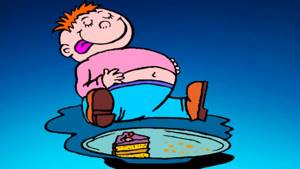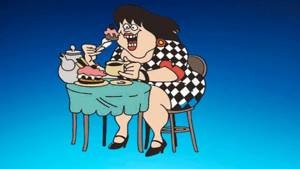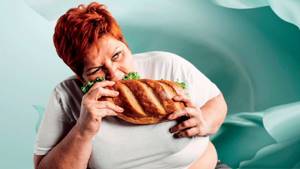Today, obesity and overweight are considered one of the most global problems of humanity. We have defeated many dangerous diseases that were previously considered incurable, but we cannot cope with overeating. Uncontrollable overeating is a disease that can develop in anyone. Our task is to be prepared for the blows of fate and try to cope with the problem on our own. But if you can’t control yourself, then you don’t need to give up. Timely assistance from a medical specialist will be a lifesaver for those who have already given up on themselves.
What is gluttony
Let's figure out what gluttony is. This is a bad habit of modern people, gluttony, which is reflected in excessive consumption of food. Uncontrolled eating of large quantities of food can be a disease that has many causes.
When the situation gets out of control, you need to understand the danger in time and start taking measures. If this is a disease, then it must be treated, otherwise the disease will seriously ruin your life. In order to understand how to deal with gluttony and gluttony, which threatens an eating disorder, it is imperative to understand the reasons.
The temptation of colorful labels in supermarkets and the smells of delicious food wafting from everywhere can instantly whet a person’s appetite. People who do not have sufficient willpower cannot resist tempting fried, fatty and sweet foods.
Gluttony is manifested by heaviness in the stomach, bloating and pain, nausea and heartburn. In this case, a person often experiences lethargy and drowsiness. In addition to the loss of a beautiful figure, gluttony and gluttony affect mental health and the nervous system.
Gluttony and gluttons. The most famous gluttons in world history
The passion for gluttony has tormented and continues to torment humanity no less than lust and drunkenness. Without much variety in entertainment, medieval commoners organized eating competitions at fairs. The disgusting twist is that they often used live cats to demonstrate their abilities. The British Library houses a hefty volume of 18th-century newspaper files that describes just such a blatant case of public “cat-eating.”
It was not only commoners who suffered from this mortal sin. Quite a few royals fell victims to gluttony. Some said that the endless marriages, executions and affairs of state served only as a background to the voluptuous gluttony of Henry VIII.

It seemed that the monarch even shortened his sleep just in order to have time to eat as much as possible during the day. He ate almost no vegetables and fruits, preferring pies and meat. Or better yet, meat pies) Heinrich can definitely be called a gastronomic gourmet. Guinea pigs and other exotic things often appeared on his table. Baked animal carcasses were often covered in gold and served on silver dishes. Another passion of the monarch was sugar and its derivatives: cakes, sweets and pastries. Thanks to the sweet, high-carbohydrate “diet,” the monarch lost almost all of his teeth and developed obesity and diabetes. At the end of his life, his waist circumference was 1.40 cm.
The French king Louis XIV (the Sun King) could compete with the king of England.

For starters, he ate several soups at once, often pouring them into one bowl. For the second course, the king ate mountains of various game, a pate made from it, and half a calf carcass. Louis lost almost all his teeth early, but this did not stop him from quickly eating his food, swallowing it in unchewed bites. Many believe that it was the monarch’s excellent appetite that was at the origins of exquisite French cuisine.
King Adolf Frederick of Sweden literally died from gluttony. He gave his soul to God right at the dinner table, unable to bear the variety and abundance of dishes served.
Russia had its own “glutton king.” Not by origin, but by vocation. Ivan Krylov had an insatiable appetite and almost never ate enough. He often complained about palace dinners, from which he left hungry:
the soup is served at the bottom, the pies are about the size of a walnut, for dessert, it’s a shame to say, half an orange with jam, you can’t reach for more
For lunch, he ate several first courses at once, 3-4 plates of pies, half a roast turkey, and a dish of chops. He finished the meal with Guryev porridge and sweet pies. The passion of the fabulist was reflected in his appearance: a camisole stained with greasy stains, a corpulent physique, shortness of breath.
It is known that towards the end of his life Elvis Presley gained a fair amount of weight.

The reason for this was ongoing depression, uncontrolled use of medications and gluttony. The “King of Rock and Roll” became a victim of the American way of life - fast food and dislike for sports. For breakfast, he ate 6 scrambled eggs with bacon and sausages, and almost every day he ordered a “Fool’s Gold” sandwich, which was made from a whole loaf generously spread with high-calorie peanut butter and bacon. Modern doctors believe that Presley had classic bulimia.
The main reasons for overeating
Everything that happens in our world has a reason, including the excessive consumption of large amounts of junk food. You need to understand that it is useless to fight the symptoms if the source of the problem is not found.
Eating disorders often arise as a result of the stress that most modern people are exposed to. With the help of baked goods, chocolate or sweets, weak-willed people relieve anxiety and anxiety.
Those suffering from gluttony try to calm their nerves with the help of high-calorie foods. This really helps, but only for a short time, and then bitter repentance sets in. The most common reasons:
- depressive states caused by loneliness, failures and personal problems;
- self-doubt and low self-esteem;
- lack of self-love;
- rejection of one's body;
- lack of diet;
- social pressure;
- lack of willpower;
- the presence of childhood psychological trauma.
Many people believe that gluttony is a sin and must be fought against. In fact, this is a disease that is a deviation from the norm. People have individual reasons for this, and each individual must understand them himself or with the help of specialists.

Biological causes of gluttony
Scientists and numerous studies confirm that the main cause of gluttony is genetic predisposition. In this case, there is a violation of the brain functions responsible for appetite.
An eating disorder occurs when the hypothalamus (the part of the brain responsible for a person's appetite) is unable to send messages about feelings of hunger and fullness. A person, not receiving a signal of saturation, continues to overeat.
Gluttony and food addiction can be caused by low levels of serotonin (a brain chemical). This is the cause of bouts of gluttony. Research results have shown that this genetic mutation is quite common.

Social reasons for gluttony
Modern society dictates its beauty parameters to people. Fashion shows present female models, declaring that this is the standard of a beautiful figure. All this is actively promoted to the masses. From TV screens we are told how beautiful thinness is, and what outfits a person with a model appearance can afford.
Constant condemnation of fat people leads to gluttony of the latter. Curvy people, realizing that they still won’t be able to lose weight, calm themselves down by eating high-calorie foods. Women are especially guilty of this.
In case of family problems, quarrels and scandals, they also find solace in food. This is a common cause of gluttony in women who binge on cakes, pastries and cookies to make life seem easier. Then the habit takes root and whenever there is a problem, the female sex rushes to the refrigerator.
Parents, and especially grandmothers, who instill poor eating habits in their children and grandchildren from early childhood, must understand that this leads to serious problems in the future.
Many parents raise their children by rewarding them with delicious food. For example, for good grades they buy chips, chocolates or crackers for their child. This is how teenage gluttony appears. Delicious food is also used to comfort and calm young children.
Psychological causes of gluttony
Experts in the field of healthy nutrition have long noticed that greed in food is closely related to depression, low self-esteem, and dissatisfaction with one’s appearance. Even simple loneliness can contribute to voracious eating and subsequent obesity from overeating.
Binge eating that involves eating large quantities of food is called compulsive overeating disorder, which most often affects women. Under various circumstances that do not suit a person, he pounces on food without noticing its quantity, quality and feeling of fullness. These people then experience feelings of depression, guilt, and self-loathing.

For some people, gluttony becomes the only possible way for the body to cope with stress. Compulsive overeating is a mental disorder and willpower does not play the slightest role here. In this case, it is useless to give advice to a person who has experienced an attack of gluttony.
Gluttony and weight are two interrelated concepts. People prone to insatiability in food begin to starve, go on diets, then break down and again begin to absorb food in even larger quantities. Diets are generally contraindicated for such people, and this behavior further provokes bouts of overeating.
There is only one way out: replace overeating with something else. Often, without specialists, a person cannot cope with this problem on his own. Sometimes the solution is simple: you can eat whatever you want, but within reasonable limits. This is called intuitive eating, where the basis is the absence of inhibitions. If people understand this, they can help themselves by changing their eating habits.

Overeating as a habit
Habit is one of the most common causes of insatiability. In this case, people constantly put something in their mouths without thinking about gluttony. People who consume huge amounts of food become indiscriminate in their eating.
They may snack on foods that do not contain nutrients. All this leads to gaining extra pounds. You need to know that any habit is formed within forty days.
The habit of “eating” failures and problems leads to overeating and obesity, which, in turn, lead to serious diseases. It is necessary to overcome a bad habit, and for this you need to find out and understand the problem, then find the right way out.
Family traditions, where frequent feasts and gluttony in the evenings are practiced, form the habit of excess nutrition in children. Children take their cues from their parents, copy their behavior, and form an addiction to food from an early age. At the same time, they love not the most healthy foods - chips, chocolates, gingerbread cookies and candies.
With gluttony, people gain weight, which is then difficult to return to normal. Nutritionists believe that addiction to food is no less dangerous than addiction to alcohol or cigarettes.
Causes and factors of gluttony
There are many reasons that can cause binge eating in a person. To figure out how to deal with gluttony, you need to find out why it might have appeared. Knowing the factors and causes will help prevent a developing problem before it develops into a serious illness.
Psychological

Scientists believe that the main reasons for gluttony lie in the plane of psychology. The percentage of people who are susceptible to this disease is regularly increasing. There are several direct psychological factors that usually lead to compulsive overeating and ultimately obesity.
- Excessive anxiety, fear of the future, major loss or psychological trauma. Often people begin to worry about the death of a loved one or separation from loved ones.
- To console or reward themselves, people prone to such problems often begin to eat in exorbitant quantities. This is called emotional overeating. Unfulfilled, unspent feelings and needs become the main reason for this.
- In terms of feelings, psychologically weak individuals feel insecure and vulnerable. Therefore, trying to hide from the world, they seem to become numb, while fencing themselves off from understanding the problem.
- Feeling very disappointed in life can also lead to overeating. When a person is not satisfied with his achievements, life in general, when everything is going wrong, the only outlet may be food, which is always “ready” to satiate and bring pleasure.
Guilt, shame, excessive self-searching and self-torment, as well as other similar feelings, often become the cause of serious psychological problems. As a result, a person simply abstracts himself from the world around him, seeking solace and calmness in food. Moreover, often, the role is played not so much by taste as by the quantity eaten.
Biological
In medicine there is even a special term - genetic predisposition to gluttony. Many years of in-depth research have shown that obese people and children are usually prone to regular overeating. The explanation for all this is quite simple: in the human body there are at least six genes, discovered in 2001-2003, that are responsible for obesity. Those who carry these genes tend to weigh slightly more than those who don't.
Moreover, this is usually true even for those who diligently look after their body, are athletes and fans of a healthy lifestyle. It would be a mistake to think that a biological predisposition to overeating is a death sentence and you are destined to remain overweight forever. However, if you have them, your chances of becoming fat increase. About 50-65% of people suffering from severe obesity carry a combination of these six genes.
Socio-cultural
No matter how strange it may sound, the basis for gluttony is often laid in us by our parents themselves. Moreover, this happens at a stage when we still cannot and do not know how to resist. Surprisingly, more than 80% of obese people were regularly abused as children without even knowing it. Remember how your mother or grandmother forced you to eat boring porridge or stuffed you with pies?
The stronger ones distributed the goodies to their friends and fed them to the cat, but the weaker ones had to force themselves to eat. The child could not resist the pressure of adults, and as a result received trauma for life, and along with it a large number of health problems and excess weight. Also, is it possible to gain weight in one day of binge eating? The answer is, of course, no, but in the end, if you think like this every time, you can gain serious excess weight.
In some families, it is customary to regularly throw a feast with a mountain, as in old Russian fairy tales. Moreover, even the culture itself seems to suggest that a good fellow can eat a whole bull. Even in fairy tales and sayings they say that workers who eat little will also work lazily. All this sets up the idea that eating large quantities of food in one sitting is healthy, an indicator of health and strength. When it comes to a loader hauling heavy bags, this is almost true, but when it comes to an office employee, the matter “smells of kerosene.”
Symptoms of overeating
To understand how to deal with overeating yourself, consider the main symptoms of gluttony:
- absorption of a large volume of varied food;
- calorie consumption up to 10 thousand at a time, instead of the norm of 1 thousand;
- unlimited food intake at any time;
- lack of diet;
- eating without feeling hungry;
- eating “sweets” in secret from family and friends;
- tendency to gluttony when completely alone;
- lack of control over eating behavior;
- being in a state of stress, which subsides after consuming a huge amount of treats;
- remorse and guilt from a sudden attack of gluttony.
Causes of gluttony
- Consequences of diet.
Many girls push themselves into limits, wanting to get rid of excess body weight. They are addicted to diets, limiting the body in the right carbohydrates, proteins and complex fats. In the process of losing weight, the body begins to react violently to changes, not agreeing with them. When the diet ends, mass gluttony begins. The body strives to make up for everything that it has not received for many months. - Lack of sleep.
During night rest, leptin is produced, a substance responsible for the excitability of appetite. Due to lack of sleep, hormone production is significantly reduced, leading to a constant feeling of hunger. If lack of sleep develops into a chronic form, severe gluttony begins. - Psycho-emotional disorders.
There are people who eat negative emotions. They literally do not leave the refrigerator, devouring high-calorie foods. Women with mental disorders suffer from a similar feature. The inability to deal with stress leads to the fact that food becomes a kind of psychologist. Even if you start meditating and put your emotional background in order, gluttony will not disappear. - Lack of vitamins.
In most cases, increased appetite develops during the cold season, when the body requires more food to warm up. The main role is played by vitamin B, which is found in carrots, meat, cereals and legumes, cereals, and vegetables. Combined with a lack of amino acids and Omega acids, hunger is constantly present. This leads to gluttony, which can be eliminated by normalizing the daily diet.
how to get rid of hunger
Treatment of gluttony
There are more and more big and fat people in the world who do not know how to deal with overeating. These gluttons have stretched their stomachs to enormous sizes and now do not understand what to do. People addicted to food sometimes join fitness clubs and go on strict diets. They begin to feel embarrassed about their appearance, withdraw into themselves, stop communicating with friends and even going outside.
Overweight gluttons understand that this is a dead end from which there is no way out. In order to find it, you need to identify the causes of excessive food consumption and begin treatment. At the first signs of gluttony, seek help from a psychotherapist who will help you cope with psychological problems and radically change the situation.
To treat overeating, the doctor will work with the subconscious, to change harmful attitudes and strengthen the necessary programs. For each case, programs are developed to adjust nutrition in combination with physical exercise. In this case, the diet must change. Yes, it is not easy and at first you will have to carefully calculate calories and monitor what goes into your stomach.

How to deal with overeating on your own? You can do without specialists if you have a great desire and willpower. Keep a diary, make daily entries describing meals and calories, and celebrate small victories as your weight moves downward.
This will give a powerful incentive to overcome your poor eating habits. Take strict control of your body’s behavior, become more attentive to it, learn to love your body and treat it with care.
Those with a sweet tooth should regulate their sweet intake. It is like a drug: the more you eat, the more you want. Nutritionists recommend replacing sugar with sweeteners. You need to choose only natural substitutes; cheap chemical ones will not bring you any benefit.
You should not keep sweets at home to avoid temptation. Nutrition experts advise eating small meals every 2-3 hours. Small meals reduce the feeling of hunger. In this case, the portion should not exceed the size of your fist. All this must be taken into account when treating overeating at home.

Drug treatment for overeating and excess weight
Modern clinics and weight loss specialists offer treatment for overeating with the help of nutritionists, psychiatrists, and therapists. The consequences of gluttony lead directly to health problems, so medical weight loss is allowed, but under certain conditions: lack of results from physical activity and diets.
Doctors prescribe medications that act in different directions. There are modern drugs for hunger relief, for weight loss, for normalizing hormonal levels and for accelerating metabolism. Medicines are selected strictly individually, because in order to know how to treat gluttony, it is necessary to take into account the characteristics of the human body.
Before prescribing medications, the doctor conducts a consultation and prescribes treatment. Pharmacists are developing new weight loss products, but they have many side effects. It is believed that the stronger the drug, the more harmful it is to the body.
You should always remember that self-treatment is dangerous for the patient. To avoid unwanted consequences, study the list of side effects, features of taking and action of the tablets.
I would like to say that you need to learn to cope with obesity after overeating yourself, because medications always give a temporary result. The pharmaceutical industry, dietitians and nutritionists profit greatly from their patients. Medicines and services are expensive, while the person himself is able to cope with his problem.
After overeating, you can use harmless activated charcoal to improve digestion and remove harmful toxins from the body. It copes well with the problem and has absorbent properties. Taken orally at the rate of one tablet per 10 kg of weight.

Folk remedies
Our grandmothers knew recipes for alternative medicine for overeating and the consequences of gluttony. Let's learn how to fight overeating with proven recipes that are easy to prepare at home.
Treatment of gluttony with herbs does not give quick immediate results, so all recipes are used for at least a month. Be sure to make sure before use that you do not have allergic reactions to the herbal components of medicinal preparations.
- Healing tea helps with obesity. Take 3 tablespoons of dried or fresh calendula flowers (marigolds), 2 teaspoons each of St. John's wort, rose hips and immortelle inflorescences. Add a tablespoon of flax seed. Mix the mixture well, then put two tablespoons in a container and pour a liter of boiling water. Cover with a towel and let the tea brew. After cooling, drink half a glass before each meal.
- To eliminate an acute feeling of hunger, a tincture of corn silk is used. Corn silk is always available for free sale in any pharmacy chain. Pour two tablespoons of dry raw material into 500 ml of boiling water, let it brew, strain and take 1/3 cup 15-20 minutes before meals.
- Recipe to curb hunger: grind tansy and chamomile in equal proportions. Mix a teaspoon of the resulting powder with a teaspoon of honey and wormwood powder. Roll the mixture into small balls, which you take as tablets with meals.
Recipes made from herbal ingredients have a good effect on the body, improve digestion, and relieve strong feelings of hunger. Let me remind you that before use you need to make sure that there are no contraindications to the herbal mixture used.
Why does a person overeat
Unfortunately, it is impossible to give a definite answer to this question. Not only is each situation unique, but also many reasons are intertwined and it is not possible to single out just one. Let's look at the most common ones:
- First of all, it should be noted that overeating has nothing to do with appetite. For some reason, it is customary to say that a person who eats a third plate of borscht at a time has an excellent appetite. But let's figure it out. What is appetite? This is a signal from our body that it needs a boost of energy. But how big should this charge be? This will surprise many people, but very little. Typically, the signal of satiety reaches the brain approximately 15 to 20 minutes after the start of a meal. If you eat at a normal pace, then during this time there is definitely no way you will be able to absorb a three-course meal and a supplement. Feasts that last for many hours are a feast for the eyes and the brain, which demands from us more and more portions of “goodies.”
- We all know the expressions “eat up problems”, “eat up grief”, etc. Indeed, by enjoying food, we seem to make up for what we have not received in life. After all, it’s much easier to buy yourself a cake and eat it than to bring back a departed lover or prove to your boss that you deserve a higher place on the career ladder. Naturally, a person does not realize why he does this, and gradually the habit becomes so deeply ingrained that food turns into a substitute for any emotions.
- Nutritional education received in childhood also plays an important role. Almost everyone had mothers and grandmothers who watched with emotion as their beloved child trampled on everything. And if the child turned out to be stubborn and preferred to fight for his right to eat little, they tried to re-educate him, teaching him to eat every last crumb from the plate. Surely many spent hours eating their lunch until they figured out a relatively safe way to get rid of the contents of the plate or still stuffed the hated food into themselves. The result of this upbringing for many was unhealthy eating behavior.
We have listed some psychological reasons that force us to eat excessively, but there are other circumstances that should also not be forgotten:
- Constant workload often forces us to give up full meals and grab on the go what comes to hand.
- An incorrect diet, when breakfasts, lunches or healthy snacks are skipped, leads to the fact that by the time a person finally gets to the table, he begins to eat everything he can stretch himself to, feeling brutal hunger.
- Unfortunately, food for many people is a source of not only energy, but also a lot of money. We are talking about food producers who benefit from us eating as much as possible. Therefore, there are often substances on our plates that force us to absorb such volumes of food that would be impossible without their presence. Another challenge for manufacturers is to reduce their costs. And now the familiar components of products or dishes are replaced with something cheap and harmful. For example, most modern sweets contain trans fats and sugar substitutes, which seem to zombify people, forcing them to eat one cookie after another.
As you can see, a huge number of factors work against a person. How to stop overeating under such conditions, how to get rid of food that is invincible to ever new portions at home?
Why is gluttony dangerous?
Constant gluttony for food is a disease, a serious illness that needs to be fought. Currently, the problem of gluttony has grown to incredible proportions and has become relevant not only in our country, but throughout the world.
With excess nutrition, the consequences of gluttony will manifest themselves as a malfunction of the internal organs. Excess food mass in the stomach, decomposing, will cause bloating, and toxins will begin to poison the entire body. There are more and more people who eat “on the run”, in a hurry, without paying attention to proper nutrition.
At the same time, the quality and quantity of food they eat is far from ideal. Daily fast food, quickly eating at the computer, uncontrolled consumption of sweets, all this leads to sad consequences. Dependence on food, which people cannot, and sometimes do not want to cope with, leads to poor health and illness.

Sometimes, during bouts of gluttony, people begin to feel disgusted with themselves due to uncontrollable eating behavior. They want to stop, but this is beyond their control, so they often fall into a depressed state.
After gluttony, such people develop self-dislike and self-rejection. Due to weight gain, the skin stretches, a double chin and folds appear on the abdomen, and the skin becomes gray. An increase in body weight threatens the development of diseases such as diabetes, strokes and heart attacks, hypertension, joint and heart diseases, and gastrointestinal problems.
Frequent overeating threatens obesity, while the body becomes clogged with waste and toxins, and internal organs become swollen with fat. The problem of excess weight requires an immediate solution and the necessary decisions must be made without delay.
How to control gluttony. Gluttony is like a disease
In a weak form with rare overeating as the only symptom, bulimia is not considered a serious pathology, since it can be a one-time reaction of the body to external psychogenic factors (mainly to severe stress). However, if the symptoms of the disease are repeated day after day, a person feels a constant craving for taking laxatives, or people with normal weight feel guilty for every bite of food, but cannot stop, this is a mental disorder fraught with complications.
What happens to the body during a bulimia attack?
For a person who has symptoms of bulimia, food becomes a drug, the dose of which must be constantly increased due to the disappearing feeling of satiety. Episodes of overeating and endless snacking are becoming more common. However, a person is aware of the abnormality of his diet, so a feeling of guilt for what he has eaten constantly lives inside, which at the same time gives rise to a new attack of hunger and the need to cleanse the body - the circle closes.
As a result, from constantly induced vomiting, the body experiences dehydration, the mucous membranes are injured, and uncontrolled use of laxatives causes problems with the intestines.

Causes of gluttony
According to medical statistics, doctors predominantly diagnose the psychological cause of the development of an eating disorder in people with bulimia, especially when it comes to women aged 15-16 and 22-25 years. People with emotional instability are especially susceptible to bulimia. There are also physiological factors that provoke the disease:
- insulin resistance;
- the presence of hormonal disorders (mainly hypothalamic-pituitary insufficiency);
- damage to the food center in the cerebral cortex (trauma);
- metabolic syndrome.
If we consider exclusively bulimia nervosa, which is considered the most common, there are several groups of reasons that can provoke it. The pressure of society, which has been fixated on thinness in recent years, can lead to a mental eating disorder. A family factor cannot be ruled out - poor relationships with parents, a painful desire for perfectionism, attempts to follow other people's expectations often accompany the disease.
How to get rid of gluttony
To understand how to deal with food addiction and overeating, you need to realize that they are present in your life and thoroughly ruin it. Then you need to firmly decide to work on pathological attachment to food.
Start to develop a healthy attitude towards food, realize that psychological problems and emotional outbursts cannot be solved with the help of food.
The question of how to get rid of gluttony can be solved in this way: do not keep delicacies at home: flour, sweet, fatty, smoked. Provide yourself only with healthy foods with plenty of fiber and vitamins.
So, let's learn to follow simple rules:
- Eat food on time. Eat five times a day in small portions.
- Do not surf the Internet while eating. In front of a TV or computer monitor, a person can eat twice as much.
- Do not use food as a reward or encouragement.
- Buy small sized dishes. In a small plate, the portion seems larger and the person gradually weanes himself from overeating.
- Find suitable ways to relax other than food. Choose meditation, deep relaxation or breathing exercises for distraction and calm.
- Take foods rich in vitamins and vitamin complexes that improve the condition of the nervous system.
- Take more walks in the fresh air. It is better to do this in nature, it helps to normalize your state of mind.
- Play sports, yoga or dance. Movement is the best way to cope with stress and improve your fitness.
- Reconsider your attitude to nutrition, give up diets, and include in your diet a properly balanced diet, which will contain enough proteins, fats and carbohydrates.
- Once and for all, give up junk food - chips, crackers, cakes, carbonated drinks.
- Eat food correctly, at a beautifully set table, chewing slowly and enjoying every bite, then your brain will receive a signal of satiety within 15-20 minutes.
By the way, sleep is a good way to combat overeating! When binge eating is on the way, make the right choice between your bed and your refrigerator. Sleep will calm the desire to fill your stomach with food and quickly restore vitality.
How to overcome gluttony. How to deal with gluttony
Most often, the reason for rapid weight gain is neglect of the laws of nature. Many people overeat for breakfast, lunch, dinner and also have time to have a snack in between. To be healthy and always stay in shape, you need to fight this problem.

Instructions
1
Before eating, drink a glass of water slowly and in small sips. You can’t imagine how much less food will fit into you after this, and no harm will come from the water.
2
In the fight against gluttony, intermediate meals are a great help. But not a donut and coffee with cream, but a glass of natural fruit or vegetable juice or, for example, an apple.
3
When you think you're ready to eat "a whole lamb," try replacing "it" with a few slices of tomato or cucumber, a slice of bell pepper, or a few radishes. You will realize that you are not so hungry, and after some time of this practice you will see that such food gives you much more strength than baked goods or meat.
4
By acting on the brain, and not on the stomach, you can choose your own “distraction system.” To do this, you need to understand what can distract your attention from the feeling of hunger. Experiment with some work, reading, exercise. Keep yourself busy with important and interesting things so that there is no time left to think about food. Just don’t get carried away too much: the diet also needs to be followed.
5
It is not recommended to drink after eating, as this disrupts the digestion process. Drink tea, juice or water only two hours after lunch.
6
You can drink about 30 g of very hot water on an empty stomach in the morning, only within reasonable limits.
7
To train yourself to be more restrained in your eating, eat a handful of whole rice for breakfast every morning for a week. Chew it very carefully and for a long time. Then do not drink or eat for 4 hours.
8
Don't forget about physical activity. Run or walk in the morning for half an hour, just before breakfast. And in the evening, before going to bed, walk briskly for 20 minutes. Oxygen will create good competition for a late dinner, and you will no longer want to go to the refrigerator in the middle of the night.
9
After a walk at night, it is recommended to drink a linden infusion or a decoction of parsley or nettle roots.
conclusions
Today we learned what gluttony is, understood the reasons for its occurrence and know how to cope with the disease. Let's change our lifestyle, diet and forget about overeating forever. Very soon, working on yourself will become a habit, the weight will gradually begin to melt away, and our figure will become slim again.

However, you need to understand that not all people are given the ability to have model body parameters, so there is no need to strive for this. Love yourself for who you are, notice your strengths and live in peace with yourself. Don’t scold yourself or reproach yourself, but set feasible goals and strive to achieve them.
Try to live in such a way that you do not have free time. Learn to switch your wild appetite and desire to open the refrigerator to other useful things in time. Keep yourself busy with interesting things, find an exciting hobby, walk more, visit interesting places, exhibitions and theaters. You will have no room for boredom, and at the same time, for overeating.
Do you ever experience bouts of gluttony? If this happens, how do you deal with it? Share your weight loss experience in the comments. If the article was useful, share it with your friends on social networks. With sincere respect to you, author of the online diary, Olga











